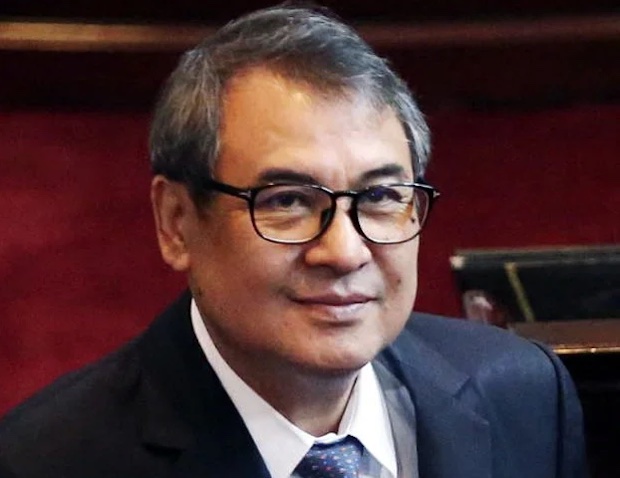
Supreme Court Chief Justice Alexander Gesmundo. (File photo by MARIANNE BERMUDEZ / Philippine Daily Inquirer)
MANILA, Philippines — The goal of quick delivery of justice was boosted on Friday with Chief Justice Alexander Gesmundo calling on the pillars of the Philippine judicial system to work more closely together in plugging the gaps that result in perennial delays.
“‘Justice delayed is justice denied’ is a line that has become overly trite,” Gesmundo said pointedly at the opening of the “justice zone” in Balanga City, Bataan province. He said it was “high time we put an end to this inefficient way of performing our collective task of delivering justice.”
A project of the Justice Sector Coordinating Council (JSCC), the justice zone program provides a mechanism for judges, state prosecutors, the police, state lawyers, and prison officials to collectively and speedily resolve issues that impede the justice system in their localities.
The justice zone in Balanga, the eighth such establishment in the country, is in the Bataan Government Center and Business Hub.
The JSCC is composed of the Supreme Court, the Department of Justice (DOJ) and the Department of the Interior and Local Government. It has opened similar facilities in Quezon City and the other cities of Calamba, Angeles, Naga, Bacolod, Cebu, and Davao.
In his speech, Gesmundo said justice zones were proving instrumental in attaining justice by ensuring coordination among the primary state actors in a particular locality.
He defined a justice zone as “an area where key programs relating to the delivery of justice are in place to maximize coordination … to address the perennial issue of delay and the greater problem of accountability.”
“Conceptually, a justice zone is the gold standard in the delivery of justice because justice is served real-time when the people actually need it,” Gesmundo said.
Speaking at the same event, Justice Secretary Menardo Guevarra said the restrictions brought about by the COVID-19 pandemic had further hampered the justice sector in resolving cases with dispatch.
“The residual effects of the pandemic and its disruptive impact predictably left our already filled dockets even more congested,” Guevarra said.
He said the expeditious administration of justice “becomes even more imperative if we are to compensate for time lost and provide relief to our people seeking justice.”
Alternative dispute resolution
The justice zone program, first put in effect in Quezon City in November 2014 during the term of Chief Justice Maria Lourdes Sereno, is aimed at shortening legal proceedings by up to 50 percent.
It involves interagency coordinative reforms in a locality, such as alternative dispute resolution, “Katarungang Pambarangay” mediation, the Mediation and Conciliation Office with the Public Attorney’s Office, the DOJ, paralegals, and an inmate monitoring system, among others.
The justice sector has committed to launching a total of 14 justice zones throughout the country by 2022. —With a report from Inquirer Research
Sources: Inquirer Archives, sc.judiciary.gov.ph, calabarzon.neda.gov.ph, gojust.org
RELATED STORY
All court personnel in areas under Alert Level 1 now required to report back to work physically
SC to pursue computerization of succeeding Bar exams
US Embassy turns over P4.2M worth of equipment to SC for videoconferencing needs